Abandoned to anarchy in Calais
Calais, France, February 3, 2016 -- To spend time in the Jungle -- the infamous migrant camp on the edge of the French port of Calais -- is to visit a place where thousands have been abandoned to anarchy.
People hunting the dream of a better life in Britain have been coming here for decades -- at least since the completion of the Channel Tunnel in 1994 gave the illusion that one could simply walk to the shores of Dover.
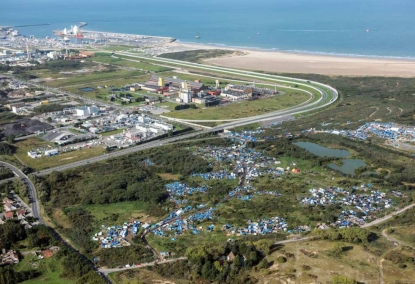 The Jungle from the air. October, 2015. (AFP / Denis Charlet)
The Jungle from the air. October, 2015. (AFP / Denis Charlet)Since the migration crisis went into overdrive a year ago, the British government has built miles of forbidding new fencing around the port and tunnel, but migrants and refugees have continued their cat-and-mouse game with customs, sneaking on to Eurostar trains and lorries, or even trying to swim the 20-miles (30-kilometre) stretch of water. Many have been run over by trains or trucks, electrocuted in the tunnel, or drowned in the freezing waters.
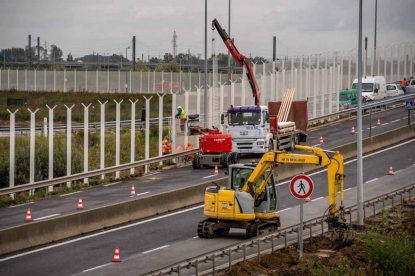 Seven-metre fencing goes up along the access route to the Eurotunnel to try and prevent migrants from trying to cross into Britain. October, 2015. (AFP / Philippe Huguen)
Seven-metre fencing goes up along the access route to the Eurotunnel to try and prevent migrants from trying to cross into Britain. October, 2015. (AFP / Philippe Huguen)As security has tightened and the crossing has become ever harder, the population of the Jungle has swelled and the camp has taken on a semi-permanent feel.
 The Jungle's church in October, 2015. (AFP / Philippe Huguen)
The Jungle's church in October, 2015. (AFP / Philippe Huguen)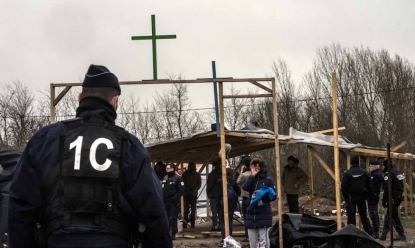 A French riot policeman stands guard during demolition of makeshift structures in the Jungle, including a church and a mosque. February, 2016. (AFP / Philippe Huguen)
A French riot policeman stands guard during demolition of makeshift structures in the Jungle, including a church and a mosque. February, 2016. (AFP / Philippe Huguen)Waiting for a better option
Sikander Nuristany is the manager of the Kabul Cafe, one of several restaurants to have popped up on the camp's high street in the past few months. His spicy eggs are excellent.
He tried a couple of times to smuggle across the Channel but gave up after he was injured. He didn't want to stay, but he didn't know where to go, so he opened the cafe while he waited for a better option and has been here for almost a year. It's a universal story -- someone seeking something better and getting sidetracked along the way.
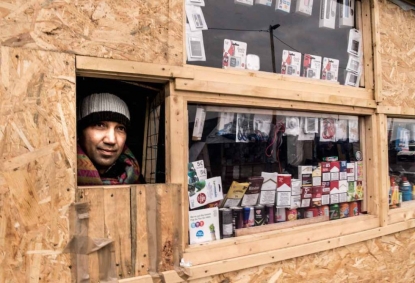 A Pakistani man looks out from his shop in the Jungle. January, 2016. (AFP / Philippe Huguen)
A Pakistani man looks out from his shop in the Jungle. January, 2016. (AFP / Philippe Huguen)I visited the Jungle in January at a time of flux.
The residents had been told to clear their makeshift wooden shelters from a 100-metre stretch around the edge of the camp.
The authorities hoped people would move into a series of refitted shipping containers they had installed nearby with a budget of 17 million euros, but almost no one was interested in going to what looked like a prison, surrounded by barbed wire, with special permission and a hand-scan needed to get in and out.
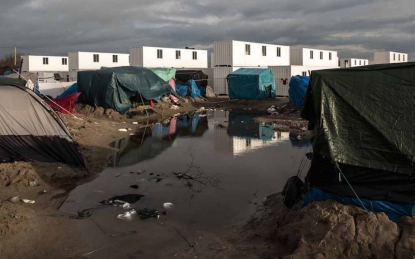 New containers and old tents. January, 2016. (AFP / Philippe Huguen)
New containers and old tents. January, 2016. (AFP / Philippe Huguen)The containers smacked of wishful thinking on the part of the authorities. Over a warm, sweet chai Sikander put it neatly: "People do not come to the Jungle just to sleep and eat. They are here to try to get to England."
The containers might have radiators and electricity, but that doesn't help much when all you care about is breaking into lorries and sneaking past customs.
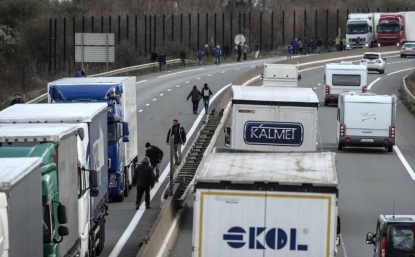 Migrants try and sneak onto lorries heading toward Britain. November, 2015. (AFP / Philippe Huguen)
Migrants try and sneak onto lorries heading toward Britain. November, 2015. (AFP / Philippe Huguen)Anarchic governance
In the meantime, the Jungle has become -– quite by accident -- an experiment in anarchic governance.
Distinct communities have emerged, roughly divided along national and sometimes religious or political lines. Trapped in desperate and traumatic circumstances, arguments have inevitably flared.
Some of the aid workers tried to calm tensions by picking out respected individuals who could settle disputes and act as community elders. It was a largely successful process, but created fresh challenges, with some voicing concerns that the new leaders were growing too powerful.
Other trappings of society have sprung up spontaneously: restaurants, a barber shop and nightclub, even a theatre and library run by British volunteers.
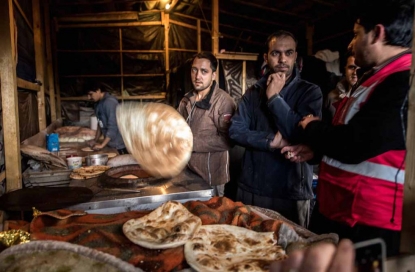 Cooking bread in a makeshift restaurant in the Jungle. January, 2016. (AFP / Philippe Huguen)
Cooking bread in a makeshift restaurant in the Jungle. January, 2016. (AFP / Philippe Huguen)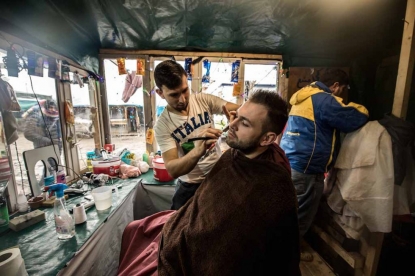 A barber shop in the Jungle. January, 2016. (AFP / Philippe Huguen)
A barber shop in the Jungle. January, 2016. (AFP / Philippe Huguen)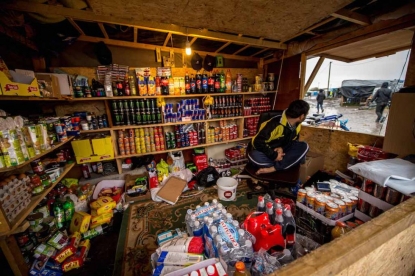 Makeshift shop in the Jungle. October, 2015. (AFP / Philippe Huguen)
Makeshift shop in the Jungle. October, 2015. (AFP / Philippe Huguen)"Everyone wants to go to the UK, but it's very hard and we need something to do while we wait," said a 15-year-old Iraqi Kurd told me. He was killing time by learning to be a journalist for a radio station set up by volunteers.
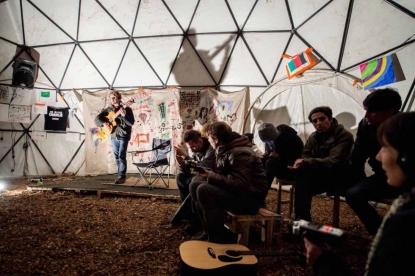 The Jungle's makeshift theater. November, 2015. (AFP / Philippe Huguen)
The Jungle's makeshift theater. November, 2015. (AFP / Philippe Huguen)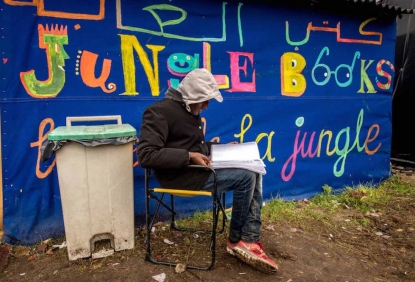 The Jungle's makeshift library. October, 2015. (AFP / Philippe Huguen)
The Jungle's makeshift library. October, 2015. (AFP / Philippe Huguen)Wishful thinking
Spending time in the camp made me realise how much wishful thinking has infected the discussion around migration, from right-wingers who think the wave of asylum seekers can somehow be halted, to liberals who believe an open-door policy does not carry security risks.
As one security consultant told me recently, if just 0.1 percent of the migrants that arrived in Europe last year could be tempted into jihad, that would create a force the size of the IRA at its peak.
At the same time, debating whether Europe should take in thousands of people is a moot point -- they are already here -- and with no sign of an end to the wars of the Middle East, they will keep coming.
There is a reason why the rules make it so hard for Europe to turn refugees away: they were written after World War II when most of the refugees were European.
For one reason or another –- often linked to family, jobs or simply language –- everyone in the Jungle is determined to reach Britain.
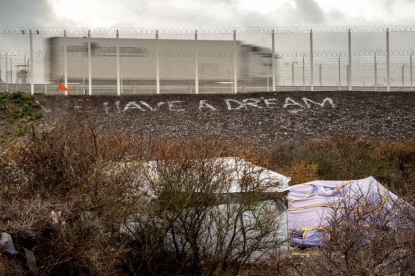 A lorry speeds by the Jungle where people have come with the dream of reaching Britain. January, 2016. (AFP / Philippe Huguen)
A lorry speeds by the Jungle where people have come with the dream of reaching Britain. January, 2016. (AFP / Philippe Huguen)Many spoke of France as a place that hates Muslims and foreigners. As several aid workers pointed out, their main interaction with the locals has been police officers throwing tear gas cannisters at them or the proto-fascists that hang around the edge of the camp to beat people up.
Activists in the Jungle accuse the British government of ignoring the grotesque conditions in the camp and trying to palm the problem off onto its European neighbours. By refusing to hear their asylum claims, London is forcing them to cross the Channel illegally when many have legitimate cases, the activists say.
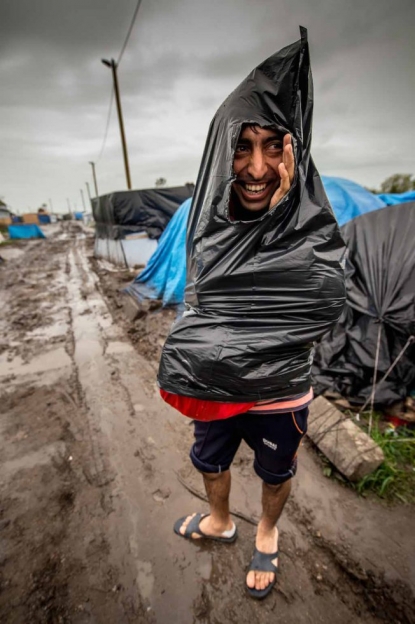 Keeping dry in the Jungle. October, 2015. (AFP / Philippe Huguen)
Keeping dry in the Jungle. October, 2015. (AFP / Philippe Huguen)In the meantime, there are thousands of people abandoned to anarchy on the French coast -- the sort of refugee camp we are used to seeing in war-torn regions of the Middle East or Africa, not in the heart of modern Europe.
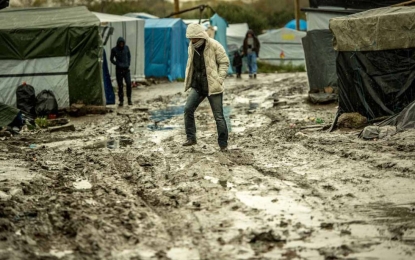 The Jungle. October, 2015. (AFP / Philippe Huguen)
The Jungle. October, 2015. (AFP / Philippe Huguen)The Jungle's residents have muddled through, as people always do, but it can not go on forever.
Eric Randolph is an AFP journalist based in Paris. Follow him on Twitter.
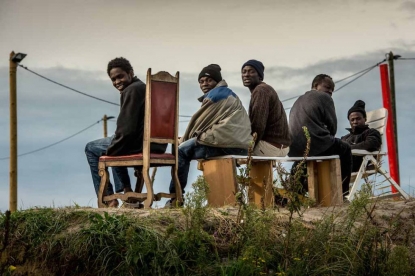 Passing the time in the Jungle. October, 2015. (AFP / Philippe Huguen)
Passing the time in the Jungle. October, 2015. (AFP / Philippe Huguen)

